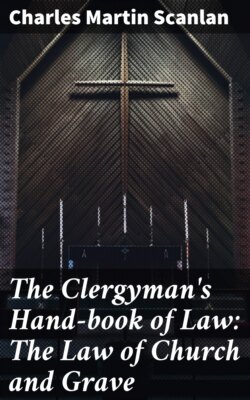Читать книгу The Clergyman's Hand-book of Law: The Law of Church and Grave - Charles Martin Scanlan - Страница 11
На сайте Литреса книга снята с продажи.
Chapter VII. Superior Authority
ОглавлениеTable of Contents
81. Protestant, Ministers, Bishop.—In most church organizations the authority is divided into superior and inferior. In countries where there is an established Protestant church, the superior authority is first in the king and queen and secondly in the bishops. The inferior authority is in the ministers and secular officers of the church. Where there is no established church, the synod or bishop is the superior authority. Thus decisions of our courts usually apply to all churches alike.
82. Roman Catholic Church, Pope, Bishops, Delegated.—In the Roman Catholic Church the superior authority is first in the Pope and secondly in the other bishops. This superior authority is graded and some of it may be delegated, as in case of a Papal delegate. But the general rule that delegated authority can not be again delegated by the delegate without special authority applies to church matters.
[pg 060]
83. Bishop, Discipline, Clergy.—Within his diocese the bishop is the executive officer, the legislature, and the judiciary; but he is subject to the superior authority of the Church. The bishop may make laws for his diocese, subject to the limitation of the general doctrine and discipline of the Church. He has original jurisdiction of all causes arising in his diocese, and may decide them in the first instance and inflict such penalties, suspension, or excommunication, in accordance with the canons of the Church, as he deems fit. The clergy are subject to his orders and discipline according to the canon law. However, without special contract, the bishop is not civilly liable for the salary of a priest under him, either while he is actually in the line of his assigned duties or while waiting to be assigned.155
84. Local, Secular Matters.—There is still another division of superior and inferior authority: the local corporation or congregation has nothing whatever to do with the doctrinal or disciplinary functions of the Church; but has only such powers and authority with regard to secular matters as is provided by the laws of the State or conferred by the articles of organization, [pg 061] charter, and by-laws. Also, unless there is some other rule to the contrary, only the male members who are over twenty-one years of age, have a voice and vote in such corporation.156
85. Unincorporated, Authority.—When a church is not incorporated, all its elections and proceedings, so far as they are not contrary to the laws of the State, must be in accordance with the rules and regulations of the Church; and the rule that the inferior authority must give way to the superior authority in all matters within the limitations of the constitution and laws of the organization, prevails.157 However, courts are not always clear on the last part of this rule.158
86. Tribunal, Action, Appeal.—When any question arises and is being adjudicated in the tribunal of the church organization, either as an original action or on appeal, the State court will not interfere so long as the proceedings are in accordance with the rules and regulations of the church, unless some vested right to property is in question or [pg 062] some one's right as a citizen of the State or of the United States is being infringed.159
87. Spiritual Authority, Excommunication.—Neither the Pope nor the bishop has any but spiritual authority within the State.160 The law of this country considers excommunication as expelling from membership; but does not tolerate interference with civil or property rights of citizens. Therefore, major excommunication non tolerati, is unlawful in the United States.161 However, a bishop is not liable for any expression of his opinion as to the extent of his episcopal authority nor for any act of omission in the exercise of his spiritual functions.162 The civil courts will not go behind a church authority to inquire as to excommunication, but may examine as to the competency of the tribunal according to the laws of the denomination.163
88. Constitution, Limited, Decisions.—A written constitution is not necessary to prove the connection between a subordinate and superior ecclesiastical body; but it will be inferred from the circumstances of the [pg 063] case.164 The superior may dissolve or reorganize an inferior body as a congregation.165 In fact the superior authority, in religious matters, is plenary, excepting as limited by the laws of the State and the constitution of the Church.166 The decisions of the ecclesiastical tribunals in all cases on doctrine, order, and discipline, are conclusive in the state courts.167
[pg 064]
